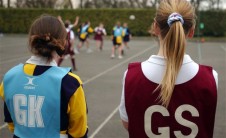Listeners to Radio 4 this week may have heard Baroness Sue Campbell, Chair of UK Sport since 2003 and the FA’s new Head of Women’s Football, talking about the importance of sport, physical fitness and wellbeing.
http://www.bbc.co.uk/programmes/b06ycwr0
https://en.wikipedia.org/wiki/Sue_Campbell,_Baroness_Campbell_of_Loughborough
In the past Sue Campbell has said, “We need to stop talking about fatness and start talking about fitness“.
There’s no doubt the majority of those who begin a regime of regular physical activity aimed at greater physical fitness immediately start to notice a greater sense of wellbeing, regardless of their size or shape. As Sue Campbell said, “Social, emotional and physical wellness underpin everything in our lives“.
We can all recognise the truth in this statement, whether or not we’re socially, emotionally and physically as well and as fit as we might be. We can all improve, and we can all become fitter, in each of these aspects of our lives.
Sue Campbell  is particularly concerned about the fitness and wellbeing of children. On Woman’s Hour she pointed out that our Chief Medical Officer has said that children should have 60 minutes of physical exercise every DAY. Yet “most of them don’t do this in a week”. Is it any wonder that so many children, like so many adults, suffer from illnesses, poor self-image, a serious lack of wellbeing and various states of obesity?
is particularly concerned about the fitness and wellbeing of children. On Woman’s Hour she pointed out that our Chief Medical Officer has said that children should have 60 minutes of physical exercise every DAY. Yet “most of them don’t do this in a week”. Is it any wonder that so many children, like so many adults, suffer from illnesses, poor self-image, a serious lack of wellbeing and various states of obesity?
How, then, do schools justify any neglect of physical fitness, since it “underpins their lives” and contributes to their social and emotional wellbeing, and no doubt their intellectual and academic wellbeing?  Very easily. No Ofsted inspector that we’re aware of is truly concerned about children’s physical wellbeing, apart from basic health and safety. The entire system pays only lip service to physical wellbeing and fitness, even though many schools take this area of their work very seriously. The problem is they get very little credit for doing so.
Very easily. No Ofsted inspector that we’re aware of is truly concerned about children’s physical wellbeing, apart from basic health and safety. The entire system pays only lip service to physical wellbeing and fitness, even though many schools take this area of their work very seriously. The problem is they get very little credit for doing so.
And why wouldn’t this neglect happen? This government, like its predecessors, has been determined to “drive up standards” – obviously meaning success in tests and exams, not standards of physical, social, spiritual and emotional fitness. The pressure to do so is passed down through Ofsted to local authorities, academy chains, individual schools and teachers, and inevitably to children. When professional lives are threatened then why wouldn’t professionals look for short-term fixes to improve test scores, even if it means marginalising children’s entitlement to physical wellbeing, especially if such marginalisation is sanctioned and indeed insisted upon by the system’s managers and inspectors? (We leave aside at this point any consideration of the pathetic lack of training for Primary teachers in improving physical fitness.)
The inevitable result is that children spend too much time sitting still – their days completely dominated by academic endeavour.
The answer to this does NOT lie with after-school physical activity. We know which of our children enjoy and therefore attend after-school sports and gymnastics. Obviously it’s those who are the strongest, fittest, fastest and most motivated – the ones who get picked for teams, etc. The ones who don’t attend are the overweight, the slowest, the clumsiest, the most self-conscious. These are the ones who are most in need of enjoyable and purposeful physical activity that’s geared towards their physical fitness, through personalised and incremental improvement and not comparative ‘standards’.
Do any of us doubt that good habits for physical fitness (as well as for everything else) are best learned in schools? We need to ensure this happens, for children of all abilities, of all aptitudes and all shapes and sizes. Does it actually do our children any good in the long run if they are academically successful but complete dunces in taking care of themselves physically (as well as socially, emotionally and spiritually)?



it,s talk about on how we must focus our physical fitness,fitness can help our daily life easier and can make us away from sickness.
LikeLike